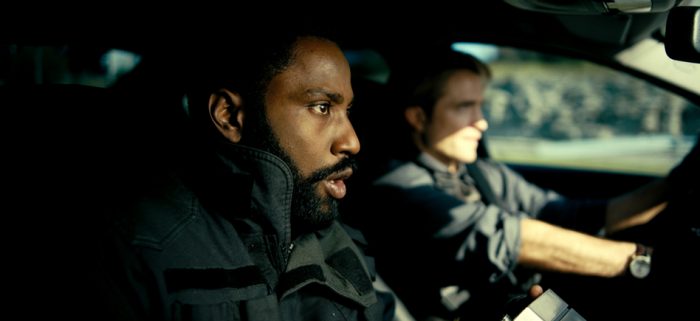‘Tenet’ Spoiler Review: Christopher Nolan Creates Stunning Action in a Frustrating, Muddled Movie
Note: I saw Tenet at a press screening with about four other people, total. We all kept our distance from one another, and as far as I can tell, we all kept our masks on for the entire time. It was a seemingly safe situation, but I cannot in good conscience tell you you must run out to the nearest movie theater anytime soon. It’s my job to cover this film and cover it I shall. But please be safe out there, and don’t put yourself – or the people around you – in any unnecessary risk for the sake of entertainment.
“Don’t try to understand it, feel it,” is a line that comes up in Christopher Nolan‘s Tenet, and it’s almost groan-inducing. It’s as if Nolan is just flat-out telling us to give up; to not try to decipher his latest cinematic puzzle. Because even if we think really hard about it, we’re still not going to know what the hell is going on. So it’s best to just go with the flow. And, sure, that can be a great sentiment. But Tenet is such an odd collection of muddled pseudo-science, inert emotional beats, and wham-bam action, that the only thing left to “feel” is befuddled. Nolan is a master technician, and with Tenet, he’s practically showing off. “Look at all this wacko stuff I’m doing!” you can almost hear him cry (albeit in a more proper way, with that accent and all). But what does it all add up to? Does it add up at all?
What do we think of when we think of a Christopher Nolan movie? A twisty narrative is a must. Spectacle has become more and more abundant. The soundtrack is loud. The sound design is even louder – so much so that sometimes we can’t even make out what the heck people are saying. And, without fail, Michael Caine has to show up. With all of those criteria in place, we can firmly say that, yes, Tenet is one of the most Christopher Nolan-y movies in the history of Christopher Nolan movies. And that’s not a bad thing! Nolan is very good at what he does. He’s one of the most popular, successful filmmakers for a reason. and after ten films, he obviously has a grasp on his craft.
So when, then, does Tenet disappoint? Why does it feel so…empty? I do not subscribe to the idea that Nolan is a cold filmmaker. He has a sense of humor – even Tenet has a few laugh-out-loud funny jokes. And he’s capable of conveying big, unapologetically emotionally beats – Interstellar is practically wallpapered with them, as is Dunkirk. But watching Tenet often feels like watching a talented magician you’ve marveled at multiple times before, and then suddenly catching on to how he does his tricks. This is not an “emperor has no clothes” moment for Nolan, but it might be a wake-up call. Maybe it’s time to scale things down a bit?
Tenet wastes no time (and time is a big part of the movie – despite the official synopsis flat-out saying that the film does not involve time travel, it’s very much about time travel). Whiz-bang prologues are another Nolan staple, and sure enough, Tenet launches with a bang, throwing is into an operation involving a CIA team infiltrating an opera house. Why are they there? Well…it’s a bit muddled (a word that popped into my head multiple times during this film), but they plan is to extract a spy whose cover has been blown and retrieve a mysterious device. Leading the charge is The Protagonist (yes, that’s really his character name), as played by John David Washington.
In case there was any doubt – and there shouldn’t be – Tenet confirms that Washington, like his father before him, is a god damn movie star. Washington is effortlessly cool here; effortlessly charming. And his physicality – he played football before becoming an actor – is on full display, with the actor throwing himself into big fights and bigger stunts.
The Protagonist is quickly established as a guy who can take care of himself, but that doesn’t stop him from getting captured by mysterious thugs – after first being saved by a mysterious masked man. After his capture, the Protagonist is informed that the rest of his team has been killed, and after some heavy mouth torture (ouch), he tries to kill himself with a cyanide pill.
But – whoops! – the pill is fake. And instead of shuffling off to the afterlife, our Protagonist wakes up in a makeshift hospital aboard a ship, where he’s informed by his boss (Martin Donovan!) about a new mission, and also a mysterious organization called Tenet.
With me so far? Sure you are, this all seems pretty cut and dry. But from here, Tenet begins to ramp up the junk-science and muffled exposition. Nolan’s movies are often criticized for their overuse of exposition, but I’ve never had a problem with it – usually because I understand what the hell the characters are talking about. The same can’t be said for Tenet, which has characters spouting off about “inverse radiation” and “reverse entropy” and “temporal tech.” Got all that? No? Well, remember: “Don’t try to understand it, feel it.”
And what is Tenet? It’s an organization trying to fight the future, literally. There are people in the future – we never really learn who, exactly – that have been sending weapons and other nefarious items from the future back to the past, er, present, where they’re retrieved by evil Russian arms dealer Andrei Sator (Kenneth Branagh). In addition to collecting all these weapons, Sator has also been trying to retrieve a bunch of pieces of something called “the Algorithm.” In true Harry Potter/fetch-quest fashion, the mysterious Algorithm has been split up into nine parts and scattered all over. If Sator gets all the pieces, its bad news – because something moving forward that comes in contact with something moving backward – or inverted, to use the term the film throws around – would spell certain doom. In other words, if Sator gets all these pieces, he can end the world.
Why would people from the future want to blow up the past? Good question! The best the movie can do in terms of an answer is talk about how the terrible humans here in the present/past have destroyed the planet with our greed and selfishness. If we’re wiped out, the world of the future might be saved. But of course, if the past is wiped out, wouldn’t that also wipe out the future? The movie skirts around this paradox by literally pointing it out, bringing up the fabled “Grandfather Paradox” – if you go back in time and kill your grandfather, wouldn’t you be killing yourself? – and then, well, just shrugging its shoulders. “Sure, that could happen!” we’re told. “But, uh, maybe not.”
Remember: “Don’t try to understand it, feel it.”
The Protagonist is joined in his quest by Neil, played by a delightfully propper Robert Pattinson as a man fond of rumpled suits, loose scarves, and dry wit. Washington and Pattinson are great together. – they have fun, easy-going chemistry. But Tenet would be better served by giving Pattinson a bit more to do. Instead, he’s mostly here for exposition detail. He clearly knows a lot about what’s going on – even more than the Protagonist. So whenever the film seems to have hit a brick wall, the script requires the Protagonist to turn to Neil and ask him to spell it out.
Also thrown into the mix is Sator’s wife, Kat, played by the statuesque Elizabeth Debicki. Nolan gets points for letting Debicki be tall here – he doesn’t try to hide her height with camera trickery, and even uses it to the film’s advantage, such as during a scene where Debicki is trapped in the back seat of a speeding car and has to reach her foot all the way up to the driver’s side door to pop the door locks. But like Pattinson, Debicki’s role is a bit lacking. She has much more of an emotional arc, for sure. In fact, she’s the only person who has a real emotional arc here. But her role ultimately boils down to your standard “damsel in distress,” and it’s disheartening. Still, good on Nolan for not throwing another “dead wife” subplot in here.
Kat loathes Sator, but she can’t leave him, because Sator is essentially holding their son hostage. The Protagonist is able to use this angle to worm his way into Kat’s life and get close to Sator, but in addition to using her, he also wants to save her and promises to help any way he can. But Sator is crafty, and catches on, leading to him physically abusing Kat in an unflinchingly brutal scene that took me by surprise. Nolan doesn’t do brutality often, and to watch Kenneth Branagh deliver kicks to Elizabeth Debicki’s stomach is not exactly what you’d call “popcorn entertainment.”
And what of Sator? Why is he, a guy living in the present, so gung-ho about ending the world to help the future? It turns out he’s dying – of pancreatic cancer. And in his sick twisted mind, if he has to die, the rest of the world should die with him. It’s the same reasoning he applies to Kat wanting to leave him – if he can’t have her, nobody can. Branagh really sinks his teeth into the character and leans hard into his faux-Russian accent. But Sator is a stock villain. Nolan is capable of crafting memorable bad guys – the Joker in The Dark Knight is the obvious gold standard – so to see him throw a paint-by-numbers bad guy into the mix here is just one of several frustrating shortcuts.
These types of character shortcuts begin to give you the impression that Nolan doesn’t really care about people at all, at least when it comes to the stories he wants to tell. Hell, the fact that the main character here is named The Protagonist seems to confirm as much. These aren’t people; they’re stand-ins. They exist merely so Nolan can put them into action set pieces.
And boy oh boy, what great set pieces they are. For all of Tenet‘s flaws, it succeeds, and then some, with its spectacle. Here, Nolan has crafted some of the most thrilling, inventive, jaw-dropping action scenes since The Matrix. And I’m not just talking about the big moments, like when a real 747 crashes into an airport hanger. I’m talking about fight sequences that play out with forward and inverted characters doing battle. One character will appear to be moving in reverse while the other moves at a normal pace, and to achieve this clearly required incredibly planning – and blocking – on Nolan’s part. He couldn’t just run the scenes in reverse, since one of the characters have to be moving in opposite directions, time-wise.
These are the moments that make you sit up and take notice. The moments that remind you that, yes, Christopher Nolan is really good at what he does sometimes. Some of the action in Nolan’s earlier films is clumsy and filmed with a blurry camera. Not so here – we can see everything that’s happening, and more often than not, I found myself perking up and wondering, “How the hell did he do that?” There’s a car chase sequence, complete with an inverted car that flips back onto its tires, that is one of the coolest things you’ll see on screen this year. It’s impossible for me to fully dislike a movie that makes me ask questions like that. The movies are magic, and when something reminds me of that, I get giddy. Adding to all the excitement is Ludwig Göransson‘s score, which is propulsive and often strange, employing weird breathing sounds and screeching guitars.
With one action set piece upping the other, the story must, therefore – by law, I guess – culminate in the biggest action set piece yet: a full-scale invasion of Tenet time cops trying to save the world. The film ends up traveling back to the beginning – that is, the same day the Protagonist charged into that opera house – with things culminating in a forgotten Soviet city. In this city, Sator wants to seal the assembled algorithm in an underground bunker so folks in the future can find it and end our world. To stop this from happening, Tenet attempts a “temporal pincer movement,” in which half of their soldiers move forward in time while the other half moves backwards, or inverts. This sets the stage for all sorts of time-fuckery, with Nolan blowing up a building both forwards and backwards – it’s a visual trick that again had me wondering: “How the hell did he do that?”, assuming it wasn’t all CGI – which it doesn’t appear to be.
In the midst of all of this, Nolan’s script finally decides to give Kat something to do, and she, too, goes back in time, to confront and kill Sator in the past. It’s great to see Debecki get to shine at this moment – she first has to seduce Sator into thinking she wants to reconcile with him before bumping him off. But it also feels like too little too late. Especially since she spends a portion of the movie laid up with a gunshot wound in her gut. But this entire sequence – the cutting back and forth between the Russian siege and Kat on the boat – is among the tensest stuff Nolan has ever created. You’ll be on the edge of your seat; you’ll be biting your fingernails; you’ll be wishing everything else in the damn movie had been as effective.
Do the heroes save the day? You bet. Does it turn out that the mysterious masked soldier who saved the Protagonist, in the beginning, was Neil? Of course it does. Does Neil reveal that he’s been working with Tenet for a long time and that the Protagonist actually recruited him in the future? Mmm-hmm. And does Neil nobly sacrifice himself to make sure things go off without a hitch? Oh yeah. And he gets to paraphrase Casablanca, telling the Protangist that this is “the end of a beautiful friendship.” It’s a brief moment of humanity that proves that Nolan could have put more of that sort of emotional beat in this thing. If he wanted to. Which he clearly didn’t.
Tenet is one of Christopher Nolan’s most action-packed movies. And it’s also one of his most disappointing. There are the bones of something brilliant here – something ground-breaking; something inspiring. But it all gets lost along the way. There’s plenty of excitement on hand here, and while some of the dialogue does indeed get lost in the sound design, you can’t help but stay hooked on the Washington, Pattinson, and Debicki, three wildly talented and attractive people giving it their all. I’m a fan of Nolan’s work. I dare say I like pretty much all of his movies – even this one, to a fault. But at this point in his career, shouldn’t Nolan be progressing rather than regressing? Or should I say inverting? Here, the filmmaker uses every trick he knows to pull off the spectacles, and forgets everything else. Telling me “Don’t try to understand it, feel it,” is all well and good. But you have to give me more to feel to make that work.
/Film Rating: 7 out of 10
The post ‘Tenet’ Spoiler Review: Christopher Nolan Creates Stunning Action in a Frustrating, Muddled Movie appeared first on /Film.
from /Film https://ift.tt/331F3vj



